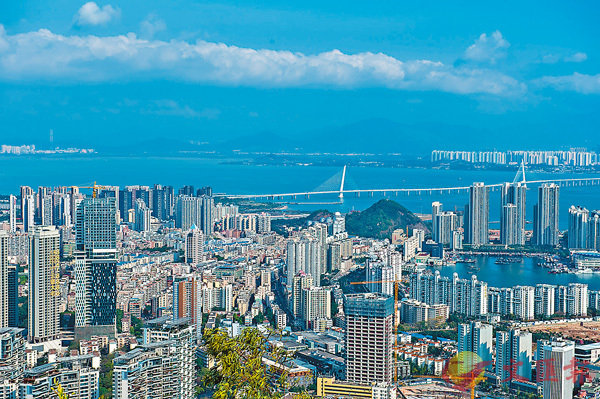 ■廣東自貿區深圳前海蛇口片區。 資料圖片
■廣東自貿區深圳前海蛇口片區。 資料圖片【原文】國務院8月初批准新設山東、廣西等6大自貿區。中國按照發展需要和既定方針,堅定擴大對外開放,開放的節奏和力度不因中美貿易戰而放緩,更不會閉關鎖國,充分展示中國的發展自信和定力。國家繼續全方位擴大開放對香港帶來大機遇,香港只有盡快止暴制亂,重回發展正軌,才能主動把握機遇,再創輝煌。
國家自貿試驗區工作自2013年啟動,已設立上海、廣東、天津等12個自貿區,此次再新增山東、江蘇、廣西、河北、雲南、黑龍江等6大自貿區,形成覆蓋東西南北中的全方位開放創新格局,目的是要通過在更大範圍、更廣領域、更多層次的探索,更好服務於對外開放總體戰略佈局。
中美貿易戰以來,外界曾擔心中國會放慢對外開放步伐,這種擔心顯然源自對中國堅持高質量發展和對外開放的決心認識不足。事實上,貿易戰並未動搖中國擴大對外開放的決心,反而力度更大、節奏明快。中國今年頒佈了外資投資法,6月30日出台了新版外商投資准入負面清單,進一步擴大農業、採礦業、製造業、服務業開放;7月10日,國務院常務會議研究繼續降低進口關稅總水平,完善出口退稅政策;8月6日,上海自貿試驗區臨港新片區正式設立。
這些舉措,在在顯示中國穩步推進對外開放,以制度創新,提升中國的國際影響力和競爭力。正如國務院副總理劉鶴在重慶出席「中國國際智能產業博覽會」發表講話時表示:「中國將堅持在開放條件下推動智慧產業發展,堅決反對技術封鎖及保護主義,歡迎世界各國包括美國在內的企業,在中國投資及經營;中國會繼續創造良好的投資環境。」
更引人關注的是,新設立的自貿區強化國家地區貿易自由化的大戰略。例如山東將探索中日韓經濟合作,廣西將打造對東盟合作先行先試示範區、西部陸海聯通門戶港,雲南將推動形成國家面向南亞東南亞的輻射中心、開放前沿。目前東盟已超越美國,躍升為中國第二大貨物貿易夥伴,中國加強與東盟合作是對外開放的新動向。設立廣西、雲南自貿區,加大向東盟開放的力度,有利擴大中國的市場,減低貿易戰對中國的不利影響。
此次新設的自貿區,皆有鼓勵對港合作的安排。山東、江蘇、廣西、雲南自貿區方案均提到「允許港澳台專業人才到自貿試驗區工作」;廣西提出「開闢港澳台人才綠色通道,為在自貿試驗區工作和創業的港澳台人才提供出入境、居留和永久居留便利」;山東、江蘇明確點出「允許港澳服務者按規定建立獨資醫療機構」。日前,前海深港現代服務業合作區宣佈,今年將安排1.4億元人民幣財政資金,用於支持港澳青年到前海發展,對港澳青年不同創業階段企業給予不同程度資助。這些安排,反映國家擴大對外開放中不忘香港。
香港長期以來都是聯繫國家和世界的橋樑和窗口,國家堅定擴大對外開放提速,香港將迎來新一輪發展的好時機。面對千載難逢的機遇,香港更應盡快止暴制亂、恢復正常秩序,積極融入國家發展大局,為國家擴大對外開放多出一分力,分享更多共同發展的紅利。(摘錄自香港《文匯報》社評27-8-2019)
Hong Kong should value opportunities brought by China's reform
【譯文】In early August, the State Council has released plans to establish new pilot free trade zones (FTZs) in six provinces, including Shandong and Guangxi. In full demonstration of the nation's confidence and determination, China will firmly expand its reforms to open up the country to the outside world in accordance with its development needs and established principles. The pace and intensity of the reforms will not be thwarted by the China-US trade war, nor will China shut itself off from the outside world. The new expansion drive of the country's all-round opening will bring great opportunities to Hong Kong. Hong Kong must return to the normal track as soon as possible if we were to prepare ourselves for future development opportunities.
Ever since China launched its first pilot FTZs in 2013, 12 FTZs have been established in regions such as Shanghai, Guangdong, Tianjin, etc. Following the establishment of the six new FTZs located in Shandong, Jiangsu, Guangxi, Hebei, Yunnan, and Heilongjiang, the all-around drive to open up the country has now stretched to all directions. The resultant deeper, wider, and multi-layered exploration could better serve the overall strategic layout of China's opening-up.
Ever since the trade war erupted between China and the United States, many have worried that China will slow down its pace in the opening-up of the country. This kind of concern is clearly originated from the lack of understanding in China's resolve to maintain high-quality development and opening-up. In fact, not only the China-US trade war has not shaken China's determination to expand its reforms, it has also done the opposite and made China even more committed. For instance, the new Foreign Investment Law was enacted this year. An updated set of negative lists for foreign investment market access were also issued on 30 June, of which the agricultural, mining, manufacturing, and business service sectors were no longer restricted to foreign investments. On 10 July, the State Council continued to explore the possibility of reducing import tariffs while raising export tax rebates during its weekly executive meetings. On 6 August, the Lingang expansion of the Shanghai FTZ was officially unveiled.
These new measures are showing that China is steadily advancing its connection to the outside world, and that it is enhancing its influence and competitiveness among the international community. Just as Vice-Premier Liu He said in Chongqing at the 2019 Smart China Expo, "China shall continue to promote the development of the intelligent industry under open conditions. We strongly oppose technology blockades and protectionism. China welcomes enterprises from all over the world, including the United States, to invest and operate in China. The country will continue to create an appealing investment environment."
Moreover, the newly established FTZs are going to strengthen the country's grand strategy of trade liberalisation. For example, The Shandong FTZ will push forward economic cooperation among China, Japan and South Korea. Meanwhile, the Guangxi FTZ will be a pilot zone of cooperation with the ASEAN region, and a western land-sea corridor. As for the Yunnan FTZ, it will promote the expansion of a major international corridor connecting South Asia with Southeast Asia.
As the ASEAN region has overtaken the United States as the second-largest trading partner of China, the deepening cooperation with ASEAN will be the new trend of the country's opening-up to the outside world. The establishment of the Guangxi and Yunnan FTZs and the increase in opening up to ASEAN will help expand China's market and reduce the adverse impact of the China-US trade war.
All of the newly established FTZs have arrangements to encourage cooperation with Hong Kong. Shandong, Jiangsu, Guangxi and Yunnan will allow Hong Kong professionals to work in FTZs; Guangxi will open a green channel facilitating Hong Kong talents to work and start businesses in FTZs, while Shandong and Jiangsu will allow Hong Kong people to set up wholly-owned medical institutions.
Recently, officials of the Qianhai Shenzhen-Hong Kong Modern Service Industry Cooperation Zone have also announced that they will earmark 140 million yuan this year, in an effort to support young people from Hong Kong and Macau to develop in Qianhai. Various degree of assistance will be provided to young Hong Kong and Macau entrepreneurs depending on their progress. These arrangements show that China has not forgotten Hong Kong in its opening-up.
Hong Kong has long been the world's gateway to China. As China accelerates its opening-up to the outside world, Hong Kong will soon embrace a new stage for development. In face of this once-in-a-lifetime opportunity, Hong Kong should stop the violence and restore law and order as soon as possible, so that we could all share the dividends of the nation's development by playing our part.■Jeffrey Tse
Exercise
1. 國務院
2. 東南亞國家聯盟 (東盟)
3. 中華人民共和國國家發展和改革委員會 (發改委) 4. 腹地 5. 一帶一路
Answer
1. State Council
2. Association of Southeast Asian Nations (ASEAN)
3. National Development and Reform Commission of the People's Republic of China 4. hinterland(s) 5. the Belt and Road Initiative

